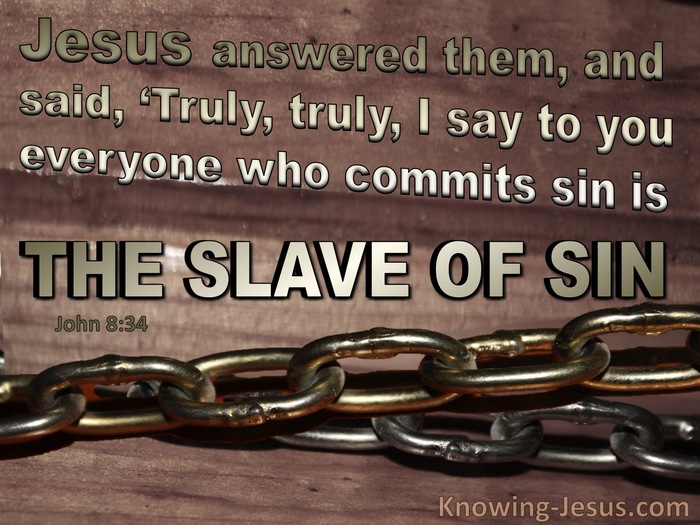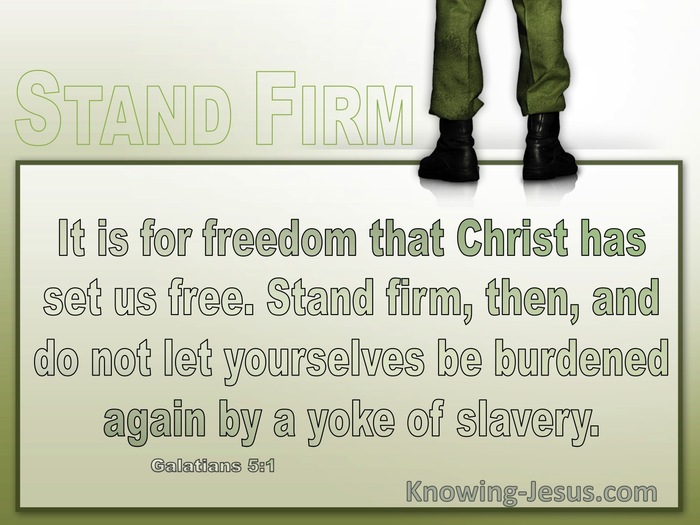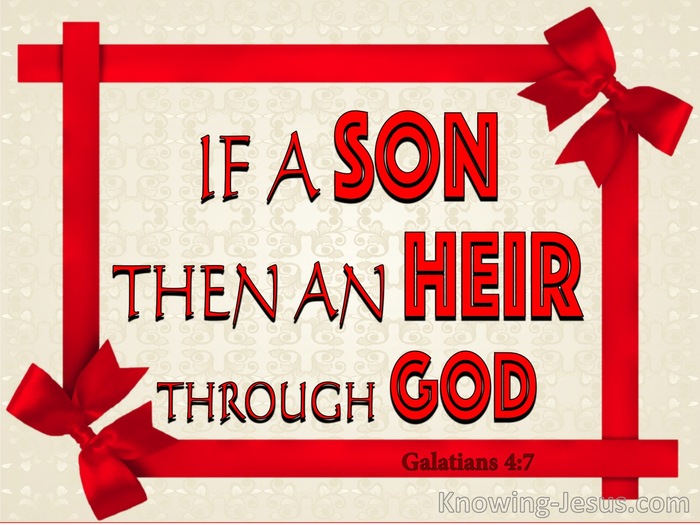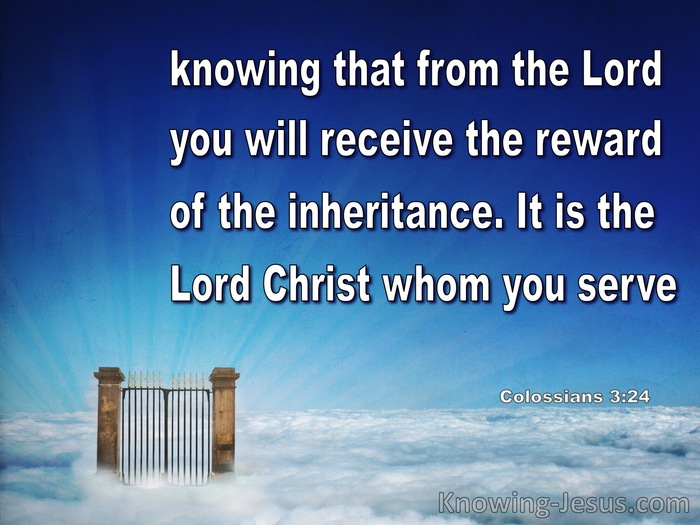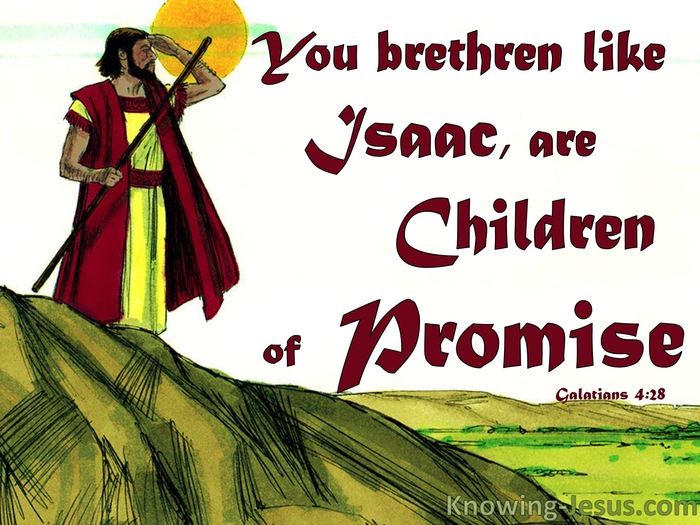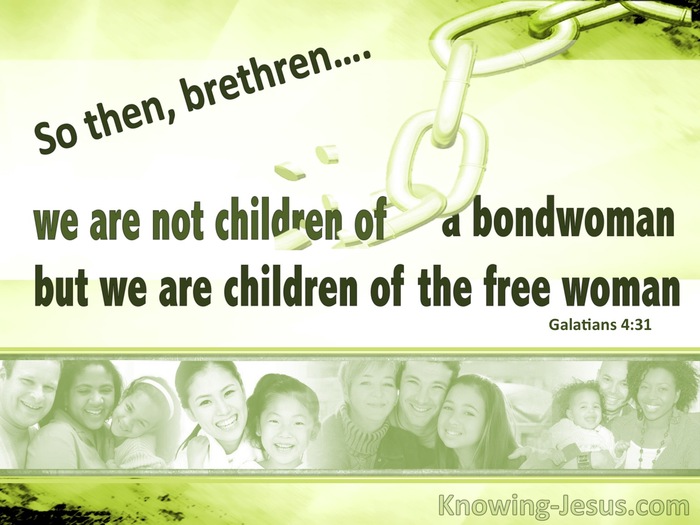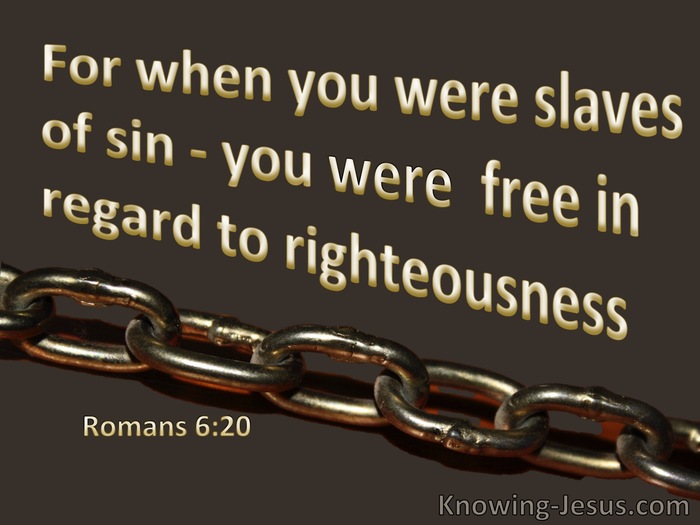36 Bible Verses about Slavery, Spiritual
Most Relevant Verses
They replied to Him, "We are descendants of Abraham and have never been slaves to anyone. How can you say, 'You will be set free'?" Jesus answered them, "Truly, truly, I tell you, everyone who commits sin is the slave of sin. Now the slave does not remain part of the family forever, [but] the son does.read more.
Therefore, if the Son sets you free [from sin], you will be truly free.
So, do not allow [the practice of] sin to rule your mortal bodies, so that you obey its desires. And do not offer the parts of your bodies [i.e., hands, eyes, etc. See Matt. 5:29-30] as tools for [accomplishing] evil purposes; but [instead] offer yourselves to God, as [people who are] alive from the dead [i.e., no longer under the power of sin] and the parts of your bodies as tools for [accomplishing] righteous purposes for God. For sin must not be your master [i.e., it must not have power over you], for you are not governed by law, but by God's unearned favor.read more.
[So], what then? Should we sin because we are not governed by law but by God's unearned favor? Certainly not! Do you not know that you are the slaves of whoever you offer your obedience to? If you obey [the desire to] sin, it leads to [spiritual] death; or if you obey [God] it leads to righteousness. Thank God that you people, who were once slaves to [the practice of] sin, became obedient from [your] heart to the pattern of teaching [i.e., the Gospel message] you committed yourself to. And when you were freed from [the practice of] sin, you became slaves to doing what is right.
What shall we say then? Is the law of Moses sinful? Certainly not! For I would not have known what sin was if it had not been for the law. For [example]; I would not have known [what it meant] to covet [i.e., have a strong desire for what belongs to someone else] except that the law said [Ex. 20:17], "You must not covet." So, through that commandment, sin found an opportunity to produce in my heart all kinds of improper desires for what belonged to others. For until there was the law, sin was dead [i.e., it did not stimulate excitement and activity as much]. And I was [once] alive before being aware of the law [i.e., complacent and without a sense of guilt]; but when [awareness of] the commandment [not to sin] came, sin sprang to life,read more.
and I died [i.e., came under its power]. And [so] the commandment, which was [intended] to bring [spiritual] life, actually brought [spiritual] death. For by means of God's commandment [against sinning], sin found an opportunity to deceive me and [even] kill me [spiritually]. So, the law of Moses itself is holy and the commandment [against sinning] is holy and just and good. Was this [commandment] then, which was intended for my good, [actually] responsible for my [spiritual] death? Certainly not! But so that sin could be seen as [truly] sinful, it produced [spiritual] death in me through something that was good [i.e., the commandment against sinning]. This was so that, by means of the commandment [against sinning], sin could be seen as extremely sinful. For we know that the law of Moses is spiritual [i.e., from the Holy Spirit in origin and character], but I am fleshly, sold as a slave to sin. [Note: "Flesh" throughout this section refers to a person's natural inclinations to sin]. For I do not [really] understand what I am doing; I practice what I do not want to and I hate what I do. [Note: This highly controversial section (verses 14b-25) is here viewed as the struggles of the apostle Paul after his conversion, and by extension, of all Christians. See Bruce, pages 150ff; Murray, pages 255ff; Lard, pages 236ff]. But if I do what I do not want to, I agree with the law [which condemns such conduct] that it is good. So, now I am not [really] the one doing this, but [it is] sin which is living in me. For I know that nothing good lives in me, that is, in my flesh, for the desire to do good is present in my heart, but the ability to carry it out [consistently] is not. For I do not do the good [things] I want to, but I practice the evil [things] I do not want to. But if I do what I do not want to, [then] I am no longer the one doing it, but [instead], it is sin which lives in me [i.e., that motivates such conduct]. So, I find this principle [at work]: [Although] I want to do what is good, evil is [always] present [and often wins out]. For in my heart I am delighted with God's law, but I see a different law [at work] in my body, waging [spiritual] warfare against the law in my mind. It brings me into captivity to the law of sin in my body. What a wretched man I am! Who will rescue me from this body doomed to [spiritual] death? Thank God [that I can be rescued] through [the power of] Jesus Christ our Lord. So then, I personally [try to] serve God's law with my mind, but [all too often] I serve the law of sin with my flesh [i.e., submitting in weakness to my human desires].
For we [Christians] were also once foolish, disobedient, deceived, enslaved to various kinds of [evil] desires and [sinful] pleasures. [We used to] live in malice and envy, hating people and being hated by them.
[Although] these people promise "liberty," they themselves are slaves to corrupting influences, for people are slaves to whatever controls them.
Christ set us free [from condemnation under the law of Moses], so we could stay free! Remain where you are then, and do not get tangled up again in the enslaving harness [of the law of Moses].
But as long as the person who has an inheritance coming to him is a child, he is really no better off than a slave, even though he himself is [rightfully] entitled [to the inheritance]. He is [still] under [the direction of] guardians and managers [of his affairs] until the day his father decides [to give him his inheritance]. So also, when we [Jews] were like children, we were under bondage to the basic worldly rules [of the law of Moses].read more.
But, when [God's] timing fully arrived, He sent His Son, born to a woman [i.e., Mary], born during [the time when] the law [of Moses was still in effect], so that He could buy back [from Satan] those who were [still] under [obligation to] the law of Moses, and that we could become adopted children. And because you are [His] children, God sent the Holy Spirit of His Son into our hearts, to call out, "Abba," [which means] "Father." So [now], you are no longer a slave but a child, and since you are a child, you also will receive an inheritance through [the blessings of] God.
For you did not receive the Holy Spirit, to enslave you again to fear, [Note: Some translators take "Holy Spirit" here to be "spirit," making the verse say "you did not receive the spirit of slavery"], but you received the Holy Spirit [who produces] sonship, so we can call out, "Abba", [which means] "Father."
Therefore, since the children share in [bodies of] flesh and blood, Christ also, in the same way, took on a human body so that, through His death, He could destroy [the dominion of] him who had the power to cause death, that is, the devil. And [also He could] release all of those people who, because of their fear of death, were [kept] in bondage all their lives.
Now it was before the Passover Festival [was to begin] and Jesus knew that the time had come for Him to leave this world and return to the Father. Those [living] in the world, whom He had loved, and who were His own [disciples], He continued to love [dearly] to the very end [i.e., of His life on earth]. The devil had already filled the heart of Judas Iscariot, Simon's son, with the desire to turn Jesus over [i.e., to the Jewish authorities]. During the [Passover] meal, Jesus, who knew that the Father had given Him complete authority, [also] knew that He had come from God and was [about] to return to God.read more.
So, He got up from the dinner table, laid aside His [outer] clothing and took a towel and wrapped it around Himself. Then He poured water into a basin and began washing His disciples feet and drying them with the towel around His waist. He came to Simon Peter, who said to Him, "Lord, are you going to wash my feet, [too]?" Jesus answered him, "You do not understand what I am doing, but you will later on." Peter said to Him, "[No], you will never wash my feet." Jesus replied to him, "If I do not wash you, you will not be able to participate with me [i.e., as a disciple]." Simon Peter [then] said to Him, "Lord, do not [just] wash my feet only, but my hands and head, too." Jesus replied to him, "The person who has already had a bath is completely clean and does not need to wash anything but his feet. And you disciples are [already] clean [i.e., spiritually], but not every one of you." For Jesus knew who would betray Him; that is why He said, "Not every one of you is [spiritually] clean." So, after Jesus had washed His disciples' feet and put His [outer] clothing back on, He reclined again [at the dinner table] and said to them, "Do you understand what I have done to you? You call me 'Teacher,' and 'Lord,' and you are right in doing so because that is who I am. So if I, then, being your Lord and Teacher have washed your feet, you should wash one another's feet also. For I have set an example for you, so that you should do as I have done for you. Truly, truly, I tell you, a slave is not greater [in importance] than his master, nor is a messenger greater than the person who sent him. If you know these things, you will be happy if you practice them.
Then Jesus called all the apostles to Him and said, "You are aware that rulers among the [unconverted] Gentiles lord it over their own people and their important men domineer over them [as well]. But it will not be this way among you, for whoever would like to become important among you will become your servant. And whoever would like to be first [in prominence] among you will be your slave.read more.
Even so, the Son of man did not come to be served [by others] but to be the servant [of others], and to sacrifice His life as a ransom price to purchase many people [i.e., back from Satan]."
Jesus called them [i.e., probably all twelve apostles] to Him and said, "You are aware that those who are regarded as rulers among the [unconverted] Gentiles lord it over their own people, and their important men domineer over them [as well]. But it is not [to be] this way among you, for whoever would like to become important among you will be your servant. And whoever would like to be first [in prominence] among you, will be your slave.read more.
For the Son of man did not come to be served [by others] but to be the servant [of others], and to sacrifice His life as a ransom price for many people [i.e., to purchase them back from Satan]."
You should think about things the way Christ Jesus did. He existed in the form of God [i.e., He shared God's very nature], but did not consider [remaining] equal with God something [to continue] to hold onto. Instead, He gave up what He had and took on the form [i.e., the nature] of a slave, becoming like a man, [and even] His appearance was found to be like a man's.read more.
He humbled Himself [by] becoming obedient [to God] to the point of death, even death on a cross. Therefore, God also exalted Him to the highest position and gave Him the name [i.e., "Lord." See verse 11], which is superior to every [other] name. [This was] so that, in [honor of] the name of Jesus, everyone's knee in heaven, on earth and under the earth [i.e., all rational creatures] should bow [i.e., before God], and that everyone's mouth should confess that Jesus Christ is Lord, to the glory of God the Father.
But now, since you have been freed from [the practice of] sin and have become slaves to God, the benefits you receive are a holy life [here] and never ending life in the future.
No person can serve two masters, for he will either hate the one and love the other, or else he will cling to the one and look down on the other. You cannot serve God and material things [at the same time].
No person can serve two masters, for he will either hate the one and love the other, or else he will cling to the one [i.e., as a close friend] and look down on the other. You cannot serve God and material things [at the same time].'"
[This letter is from] Paul, a slave of Jesus Christ, [who was] called to be an apostle, [and] set apart for [preaching] the Gospel of God.
In whatever you do, work wholeheartedly, as though it were for the Lord and not [just] for people, knowing that you will receive from the Lord a [spiritual] inheritance as a reward, [for] you are [really] serving the Lord.
[This letter is from] James, a slave of God and of the Lord Jesus Christ, [who sends] greetings to the twelve tribes which are scattered throughout the world. [Note: This refers to Christians, probably of Jewish descent].
As servants of God, you should live as free people, but do not use this freedom to cover up your wrongdoing.
[This letter is being written by] Simon Peter, a slave and apostle of Jesus Christ, to those who have received a faith just as precious as ours, through the righteousness of our God and Savior Jesus Christ.
So then, brothers, we are under obligation, but not to live under [the control of] the flesh, for if you people live under [the control of] the flesh, you must die [spiritually]; but if you put to death [i.e., stop practicing] the [sinful] habits of the body by [the power of] the Holy Spirit, you will live [spiritually]. For all of those who are led by the Spirit of God are the children of God.read more.
For you did not receive the Holy Spirit, to enslave you again to fear, [Note: Some translators take "Holy Spirit" here to be "spirit," making the verse say "you did not receive the spirit of slavery"], but you received the Holy Spirit [who produces] sonship, so we can call out, "Abba", [which means] "Father." The Holy Spirit Himself bears testimony [along] with our [human] spirit that we are the children of God. And if we are [His] children, then we have an inheritance from God [i.e., blessings here and hereafter] and are fellow-sharers with Christ [of such blessings], providing we [are willing to] suffer with Him, so we can also be honored with Him [i.e., in the future life. See verses 18-25].
I do not call you slaves anymore, for a slave does not know what his master is doing. But I have called you friends, because I have told you everything that I heard from my Father.
Was not our forefather Abraham made right with God by deeds [of obedience] when he offered his son Isaac [as a sacrifice] on the Altar? [Do you not] see that faith cooperated together with his deeds, and faith was made complete by [his] deeds? So, the Scripture was fulfilled, which says [Gen. 15:6], "Abraham believed God and [so] God considered him righteous," and he was called God's friend.
Then Jesus said to those Jews who had believed [in Him], "If you people continue [obeying] my message, then you are truly my disciples. And you will know what the truth is and the truth will set you free [i.e. from bondage to sin]." They replied to Him, "We are descendants of Abraham and have never been slaves to anyone. How can you say, 'You will be set free'?"read more.
Jesus answered them, "Truly, truly, I tell you, everyone who commits sin is the slave of sin. Now the slave does not remain part of the family forever, [but] the son does. Therefore, if the Son sets you free [from sin], you will be truly free.
Tell me, those of you who desire to be under [obligation to the requirements of] the law of Moses: Are you really paying attention to what the law of Moses says? For it is written in the law about Abraham's two sons [Gen. 16]; one [was] by his slave woman [Hagar] and the other by the free woman, [his wife, Sarah]. Now the son [Ishmael], born to the slave woman, was born simply of their natural relationship; but the son [Isaac], born to the free woman, was born in fulfillment of a [divine] promise.read more.
This set of circumstances contains an illustration; for these two women [Hagar and Sarah] represent the two Agreements [between God and mankind]. The one [Agreement], given at Mount Sinai, represents Hagar, whose children became [the Israelites], enslaved under bondage [to the requirements of the law of Moses]. Now this woman, Hagar, is similar to Mount Sinai, in Arabia, and represents the present [earthly] Jerusalem [i.e., Israel], consisting of children in bondage [to the law of Moses]. But the heavenly Jerusalem [Heb. 12:22] consists of free people, and is the mother of us [Christians]. For it is written [Isa. 40:1], "[Woman] you should be happy that you have not had children. Cry over your inability to experience the pain of childbirth. For the deserted woman has had more children than the one with a husband." Now, brothers, you [Christians] are children of the promise [made to Abraham. See 3:29] just like Isaac, [Abraham's son] was. But, just as it was then --- the son born in the ordinary way [i.e., Ishmael] persecuting the one born according to the Holy Spirit's [leading, i.e., Isaac] --- so it is now [i.e., Jews urging compliance with the requirements of the law of Moses persecuting those who refuse to return to dependance on that law for salvation. See 3:1-3]. What does the Scripture say about this matter? [It says, Gen. 21:10-12], "Get rid of the slave woman [Hagar], with her son [Ishmael]; for the son of the slave woman [Ishmael] will not inherit [what God promised to Abraham and his descendants], along with the son of the free woman [i.e., Isaac]." Therefore, brothers, we [Christians] are not the [spiritual] children of the slave woman [Hagar] but of the free woman [Sarah].
[So], what then? Should we sin because we are not governed by law but by God's unearned favor? Certainly not! Do you not know that you are the slaves of whoever you offer your obedience to? If you obey [the desire to] sin, it leads to [spiritual] death; or if you obey [God] it leads to righteousness. Thank God that you people, who were once slaves to [the practice of] sin, became obedient from [your] heart to the pattern of teaching [i.e., the Gospel message] you committed yourself to.read more.
And when you were freed from [the practice of] sin, you became slaves to doing what is right. I am using human reasoning because of your human weakness. For just as you once offered the parts of your bodies as slaves to impurity and to wickedness, which led to further wickedness; so now [you should] offer the parts of your body as slaves to do what is right, which leads to holy living. For when you were [once] slaves to [the practice of] sin, you were free from [being controlled by] righteousness. What benefit did you receive at that time from doing the things you are now ashamed of? For the end of such behavior is [spiritual] death. But now, since you have been freed from [the practice of] sin and have become slaves to God, the benefits you receive are a holy life [here] and never ending life in the future. For the wages for sinning is [spiritual] death, but God's free gift is never ending life in [fellowship with] Christ Jesus our Lord.
For although I am free from [being accountable to] all people, I placed myself under obligation to them [as a slave], so as to win as many as possible [to Christ].
For we do not preach ourselves, but [we preach] Christ Jesus as Lord, and ourselves as your slaves for Jesus' sake.
For you brothers were called [by God] to enjoy your freedom; but do not use this freedom as an excuse for living a sinful life; instead, use it to render loving service to each other.
"Who then, is the trustworthy and sensible slave, to whom his master has assigned the management of his household to provide timely meals for its members? That slave will be happy when his master returns to find him doing his job [well]. Truly I tell you, he will put that slave in charge of his entire estate.read more.
But if that slave, with evil intent, should think to himself, 'My master will not be back very soon,' and then becomes physically abusive to his fellow-slaves, and eats and drinks [at parties] with drunkards, that slave's master will return on a day that he least expects, and at an unknown hour. And [that master] will whip him to shreds and will turn him over to suffer the same fate as hypocrites do. That fate will involve crying and excruciating pain."
And the Lord answered, "Who then is the trustworthy and sensible property manager, to whom his master will assign the management of his household, to provide adequate and timely meals for its members? That servant will be happy when his master returns to find him doing [his job] well. Truly I tell you, he will put that slave in charge of his entire estate.read more.
But if that slave should think to himself, 'My master will not be back soon,' and then becomes physically abusive to his men and women servants, and eats and drinks and gets drunk, that slave's master will return on a day that he least expects, and at an hour unknown [to him]. And [that master] will whip him to shreds and will turn him over to suffer the same fate as unfaithful servants receive.
"For the kingdom of heaven is similar to a man who planned to go on a trip to a distant country, so called his servants and entrusted to each of them a large sum of money [Note: The narrative that follows suggests that the man was turning over some of his assets to financial managers to invest for him]. He gave one servant five talents [Note: This 'talent' was a large sum of money in the form of a certain weight of silver. It was the equivalent of sixty years of a farm laborer's wages, or about $750,000 in income]. He gave two talents to another servant and one talent to another. He gave to each one an amount in keeping with his ability [to invest it wisely], and then left on his trip. The one with the five talents soon invested the money in business transactions which netted him five more.read more.
In the same way the one who was given two talents made two more. But the one who was given one talent went and dug a hole in the ground and buried his master's money. Now after a long time the master of these servants returned [from his trip] and proceeded to go over his accounts with each of them. The one who had been given five talents came bringing another five and reported, 'Master, you entrusted me with five talents. Look, I have earned five more with them.'
So, He said, "A certain distinguished gentleman went to a distant country to receive a royal appointment [i.e., as king over a territory] and then return. [Note: This is the only parable of Jesus' that correlates with a known incident; that of Herod's son Archelaus going to Rome to receive from Caesar Augustus an appointment to rule over Judea, Samaria and Idumaea in So, he called ten of his slaves and gave each of them a sum of money [Note: The amount of each sum was equivalent to one hundred days of a farm laborer's pay, or about $7,000 in 1994]. [Then] he said to them, 'Invest this money until I return.' But the citizens [of his newly acquired kingdom] hated him and sent a delegation after him [i.e., to the person who appointed the gentleman king over them], saying, 'We do not want this man to rule over us.'read more.
And it happened when the gentleman returned, having received his appointment as king, that he ordered the slaves to whom he had given the [sums of] money, to report to him. He wanted to find out how much [money] they had made on their investments. So, the first one appeared in front of him, and said, 'Master, your sum of money has earned ten times more.' And the gentleman replied, 'Well done, you are a good slave. Because you have proven trustworthy over a [relatively] very small matter, you will [now] have charge over ten towns.'
"But which of you, whose slave is plowing or tending sheep, will say to him when he comes in from the field, 'Come and sit right down to eat'? Would you not say to him instead, 'Prepare the food for my meal [first] and get ready to serve me until I have had enough to eat and drink and [then] afterward you can eat and drink [yourself]'? Would he thank his slave for doing the things that he was ordered to do?read more.
So, you too, after you have done everything you were told to, should say, 'We are unworthy slaves. We have done [only] what we were supposed to do.'"
For [all] creation [Note: "Creation" here refers to the material heavens and earth, and is personified through verse 23] is eagerly waiting for the children of God to be revealed [i.e., in their glorious state]. But God subjected the created world to aimless frustration [i.e., after the fall. See Gen. 3:17-18] --- it did not happen by its own choice. Yet there was hope that the created world itself would be freed from its slavery to corrupting influences [i.e., produced by the fall] and receive the glorious freedom which belongs to God's children.read more.
For we know that the entire created world moans in painful anguish [i.e., as a woman in childbirth] until this present moment.
